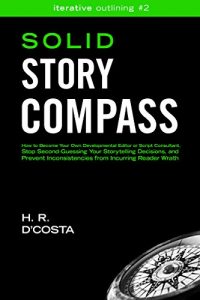Make Your Story the Best It Can Be…Without Paying a Pro Thousands of Dollars for Editing or Analysis
Having written.
It’s a beautiful feeling, isn’t it?
Instead of staring at a pile of blank pages, you’re looking at something else: pages filled with words.
Lovely.
But then, you take a second look at what you’ve written.
That beautiful feeling?
Pfft.
It vanishes.
Something’s wrong, but because you’re too close to the material, you can’t pinpoint what it is.
All you know is that your story requires major editing and revision.
It’s muddled. Awkward. All over the place.
Basically, there’s a gap (OK, sometimes, it’s more like a chasm) between the story in your head…and the one you’ve actually penned to paper.
This creates a big problem.
If you don’t take corrective measures, audiences won’t engage with your screenplay or novel. Instead, they’ll be too busy trying to figure out what it’s about.
Depending on how uneven your story is, audiences are going to walk away from it feeling anything from minor disgruntlement to major wrath.
Clearly, this is not the way to get book lovers or studios to clamor for your work. It’s not the way to jumpstart or sustain a writing career.
To achieve the results you want, you need help.
A Developmental Editor or Script Consultant to the Rescue…?
With cool objectivity, a talented developmental editor or script consultant can explain what’s wrong, what’s weak, and what’s not working—and dish out the fixes.
Finding a good one, however, is about as easy as finding an honest politician. Not only that, developmental editors and script consultants aren’t cheap.
They can cost anywhere from hundreds to thousands of dollars.
Until you find your dream editor or consultant—whose sensibility, availability, and affordability suit your needs—what can you do?
You can’t send your story out into the world the way it is, not when it’s a mass of inconsistency that’s sure to trigger negative reviews or brutal coverage.
Nope. That’s not going to cut it.
Until you find your perfect editorial match, you must learn…
How to Edit a Novel or Screenplay—On Your Own
Instead of hiring a developmental editor or script consultant, you’ll construct a 5-pointed story compass.
By breaking down “the big picture” into 5 specific areas, your compass makes it easier to identify—and fix—what’s wrong.
For instance, without your story compass, you might vaguely sense that something’s off about your climax. With your compass, you’ll know that the behavior of the villain’s henchmen needs to be changed since it messes up your story’s tone.
Should a scene be kept…or deleted?
Your story compass can help you there, too. No matter how inventive or well written, if a scene doesn’t adhere to your compass points, it’s irrelevant. It must be cut (or heavily revised).
Ultimately, with your story compass, you’ll be able to edit your own writing and bridge the gap between the story in your head and the story on the page.
Consequently, rather than falling into this gap, audiences are free to immerse themselves in the world you’ve carefully built up, from scratch.
A Sampling of What You Will Accomplish with This Step-By-Step Writing Guide
- You’ll smooth out your plot and avoid comments like, “it was all over the place” or “it unraveled quickly.”
- You’ll answer 2 questions to verify that backstory hasn’t taken over the main plot.
- You’ll ensure that audiences invest in your hero—instead of in another character.
- You’ll maximize genre’s ability to be your personal rainmaker.
- You’ll confidently tackle 5 kinds of tonal inconsistencies.
- You’ll use 6 tools to extract potential themes from your story; after which, you’ll polish one of them until it shines.






